Termination of Service Clauses
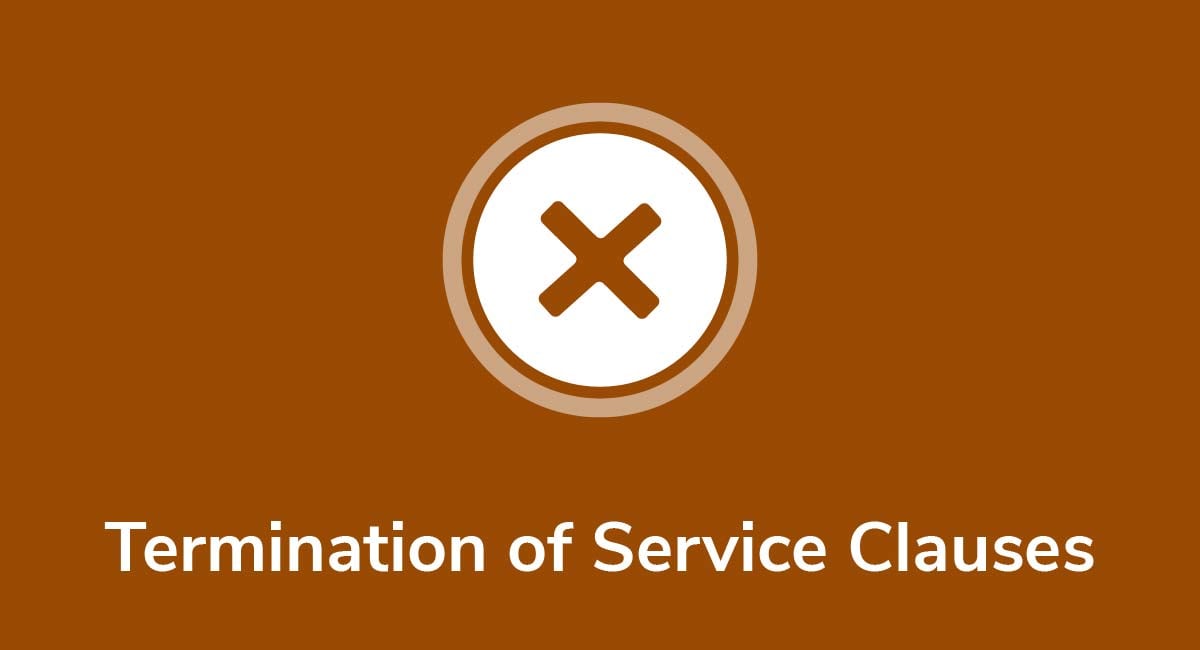
A termination of services clause, or termination clause, is an important part of the contract between your business and its customers. Without this clause, you might find it harder to end contractual agreements and maintain control over your website or service.
Here is a breakdown of how a termination clause works, why it's important, and what you should include in your own termination of service clause.
Need Terms and Conditions for your business? We can help you generate a customized Terms and Conditions agreement in around two-three minutes for free. Try our Terms and Conditions Generator and just follow these steps:
- Click on the "Create your Terms and Conditions today" button.
- At Step 1, select the where will you use your Terms & Conditions and click "Next step":
- Add information about your business:
- Select the country and continue to the "Next step":
- Answer the questions about your business practices and click "Next step" when finished:
-
Enter your email address where you'd like your agreement sent and click "Generate."

You're done! Now you'll be able to instantly access and download your new agreement.
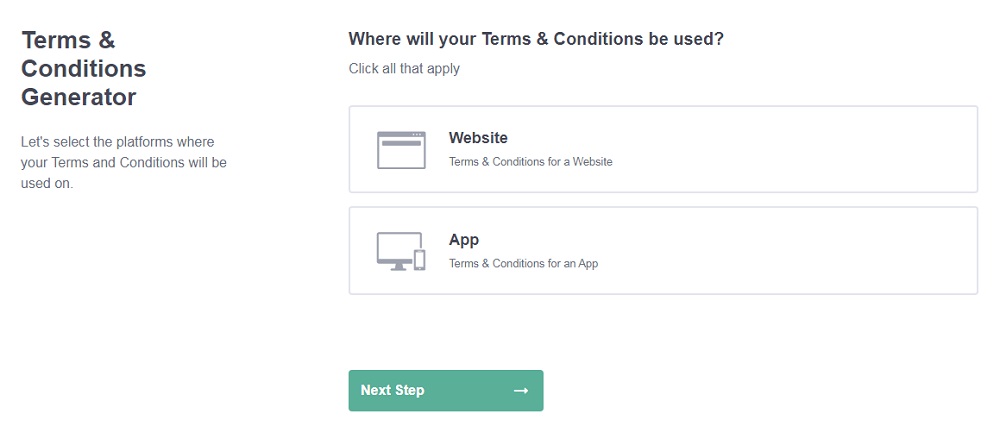
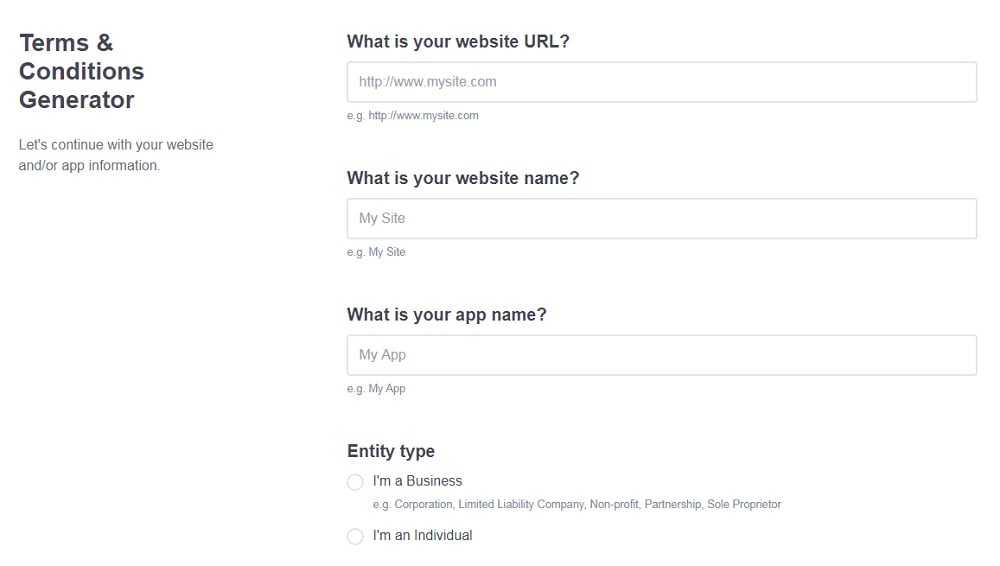
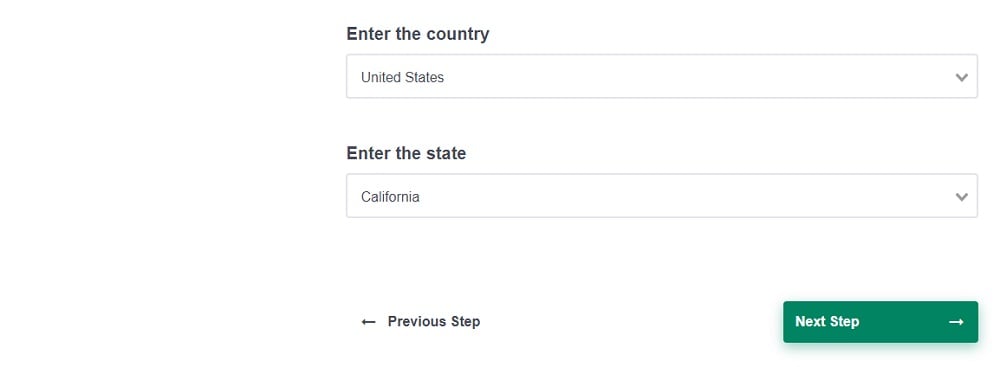
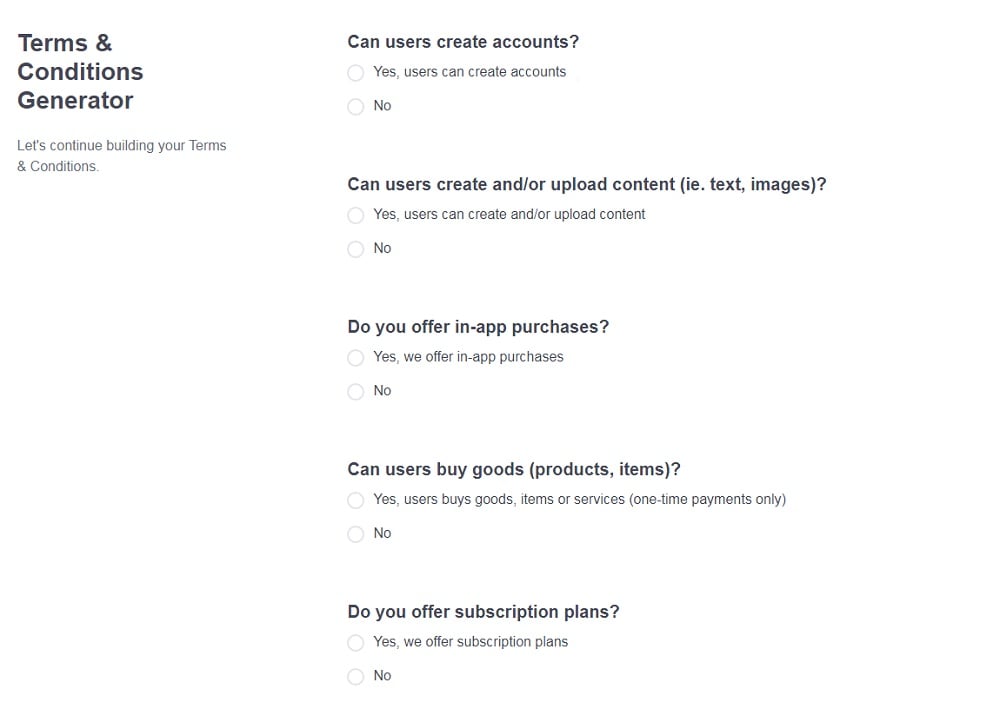
- 1. What is a Termination of Service Clause?
- 2. Where Do You Find Termination of Service Clauses?
- 3. Who Needs a Termination of Service Clause?
- 4. What Happens if There's No Termination of Service Clause?
- 5. Writing a Termination of Service Clause
- 5.1. Write Your Own Clause
- 5.2. Use a Generator
- 5.3. Hire an Attorney
- 6. What to Include in a Termination of Service Clause
- 6.1. 1. Grounds for Termination
- 6.1.1. Service Discontinued
- 6.1.2. User Breaches
- 6.1.3. Business Discretion
- 6.2. 2. User Termination
- 6.3. 3. When Termination Takes Effect
- 6.4. 4. Consequences of Termination
- 6.5. 5. User Generated Content
- 6.6. 6. Refunds and Fees
- 7. Conclusion
What is a Termination of Service Clause?
A termination of service clause sets out when you can terminate a user's account or prevent them from using your services. These clauses are legally binding, so you're entitled to enforce them, but you must also honor the other party's rights as set out in the agreement.
Without a termination clause, users might expect you to provide a service indefinitely, even if they breach your Terms and Conditions agreement.
Termination of service clauses are important for the following reasons:
- They give you legal grounds for suspending services
- They give you more control over how you manage your business
- They can deter users from behaving in a certain way so they don't lose access to your services. This deterrent helps keep your platform a safer and more enjoyable place for all users.
We'll cover how to write termination of services clauses shortly, but here's a part of Etsy's termination clause so you have an idea what they look like:

Where Do You Find Termination of Service Clauses?
Typically, you find these termination clauses in service contracts, such as a website's Terms and Conditions agreement. You can also find them in other legal agreements such as:
- End User License Agreements (EULAs)
- Commercial contracts
- Employment contracts
- Real estate contracts
To be clear, Terms and Conditions agreements can go by many names. Other names for Terms and Conditions agreements include:
- Terms of Service
- Service Agreement
- Terms of Use
- User Agreement
There's no need to call your clause a "termination" clause either, so long as the meaning is clear.
Twitter, for example, calls it an "Ending These Terms" clause:

And Krispy Kreme calls titles its clause "Modifications/Suspension/Termination:"
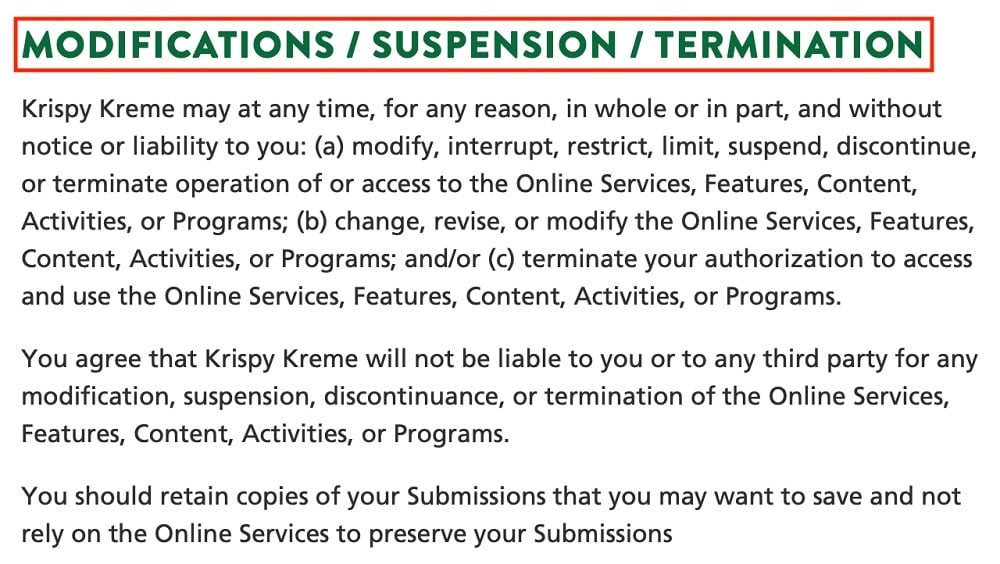
So long as it's clear what the clause relates to, then there's no need to specifically call it a "termination of services" clause.
Who Needs a Termination of Service Clause?

There's no legal requirement to write a termination clause into your Terms and Conditions or Terms of Service. However, you'll benefit from a termination clause if you:
- Run a service where users can create an account e.g. a social media platform
- Provide paid content on your site, such as a subscription service
- Let users upload user generated content (UGC) to your website, app, or platform
- Sell goods or services to others on your website, app, or platform
If there's any doubt whether you need a termination of services clause, think of it this way: If you offer services to customers, and you want the opportunity to end your services at any time, then you need a termination clause.
What Happens if There's No Termination of Service Clause?
If you don't include a termination clause in your Terms and Conditions, a number of things could happen:
- You might find it difficult to terminate a user's account even if they breach your Terms and Conditions
- Users may expect you to continue providing services, even if you wish to end your service agreement with them
- You could become involved in time-consuming and costly legal disputes
Even if there's no termination clause, you can often still end a contract under "common law" rights if you provide reasonable notice. However, contract law varies by state and jurisdiction, and so it's always advisable to include a termination clause rather than relying on other legal remedies.
Writing a Termination of Service Clause

You have a few options when deciding how to write your own termination clause. You can:
- Write your own clause
- Use a template or generator
- Hire an attorney
Write Your Own Clause
If you're comfortable writing your own clause, then start by deciding what actions trigger termination. Then, decide when termination takes effect, and what happens when the service ends. Make sure you also explain how users can end the agreement and how long it takes to deactivate their account.
If it's a paid service, commercial laws in your jurisdiction will determine when you must offer refunds and whether you can collect any outstanding fees. Make sure you understand how these laws apply before writing your clause.
The rest of this article will also help you write your own.
Use a Generator
With an online generator, or template, all you do is input some business information and the generator creates your clause for you. You can customize the clause to suit your evolving business needs.
Try our Terms and Conditions template or Terms and Conditions generator and see how well they work for you.
Hire an Attorney
If you're unsure how to write a termination of services clause, consider hiring an attorney. They can draft your Terms and Conditions agreement and they'll help ensure every clause is legally enforceable.
What to Include in a Termination of Service Clause

Every termination clause should cover six fundamental points, which are as follows.
1. Grounds for Termination
First, make it clear that you have the right to end the agreement. Then, set out your grounds for termination. Common grounds for terminating a service agreement include:
- You can't provide the services anymore
- A user violated your Terms
- You're exercising your discretion
If you don't set out your grounds for termination, then a user might argue you suspended their account unfairly.
We can break down each of these grounds in turn.
Service Discontinued
It's important you reserve the right to stop providing services if, for example, you make a commercial decision to discontinue them, or there's a financial reason you can't provide them any longer.
Let's consider Monday.com's Terms of Service. The company can terminate the agreement if, for example, it stops trading or it's subject to insolvency proceedings:

HubSpot has a similar clause to protect the company if its business ends or it enters insolvency proceedings:

Make sure it's clear you can stop providing services if it's ever no longer possible for you to do so.
User Breaches
You should always be able to terminate someone's account if they violate your Terms of Service or other legal policies.
YouTube, for example, explicitly reserves the right to terminate services if a user breaches the Terms of Service:
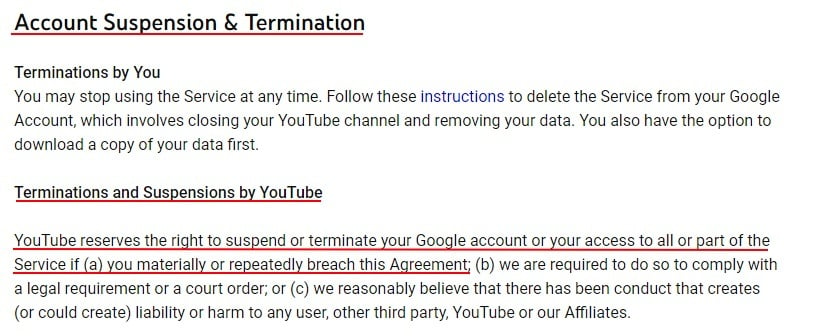
And here's a look at Shopify's Terms of Service, which allows it to end the agreement if the user behaves fraudulently in contravention of the Terms of Service:

For clarity and to prevent misunderstandings, it's best if you set out what constitutes a breach of the terms elsewhere in your Terms of Service.
Business Discretion
It's important you retain a general right to stop providing services at any time and for any reason. This is a "catch all" term to keep it simple for you to terminate services without breaching the User Agreement.
Here's how Airtable phrases this point. The inclusion of "without notice and liability, without cause or for any reason" gives the company a wide discretion to terminate services when necessary:

We should also note that in this case, even when services end, the users may still be bound by the Terms of Service. It's often worth including a statement like this to protect your legal rights even after a service agreement ends.
HubSpot has another interesting clause at 4.4. we should consider, too. This business reserves the right to terminate an agreement if it decides a user acts in a way which negatively impacts the business. This is a broad clause, but it's sufficiently clear to deter users from violating the agreement:

HubSpot can use its discretion to determine if an account should be terminated on this basis.
2. User Termination
Users normally have the right to end a service agreement, so you must address:
- How users can delete their account
- What happens if they want to cancel their account before the end of an agreed term
- What steps they must take to cancel packages e.g. subscriptions
- How they can cancel auto-renewals
- Whether they'll receive a refund for services paid for upfront
SEMRush offers a good example. The clause is clearly named "Subscription Cancellation by You" and explains how a user can end their account. In summary, users can cancel at any point by contacting the company, but they won't receive a refund of unused or prepaid fees:

Shopify has a simpler clause, but it's equally effective. Under Section 14 of the Terms of Service, users can terminate their account at any time by contacting the relevant department:

If users can close their accounts, make sure it's clear what steps they must take to end the agreement.
3. When Termination Takes Effect
As part of your clause, you should establish how quickly account termination takes effect e.g., immediately, within 24 hours, and so on.
Instagram, for example, disables a user's account access immediately if it's needed to protect the community or services, but if a user starts the deletion process it will take no more than 30 days after the request to delete the account, with up to 90 days to delete the content:
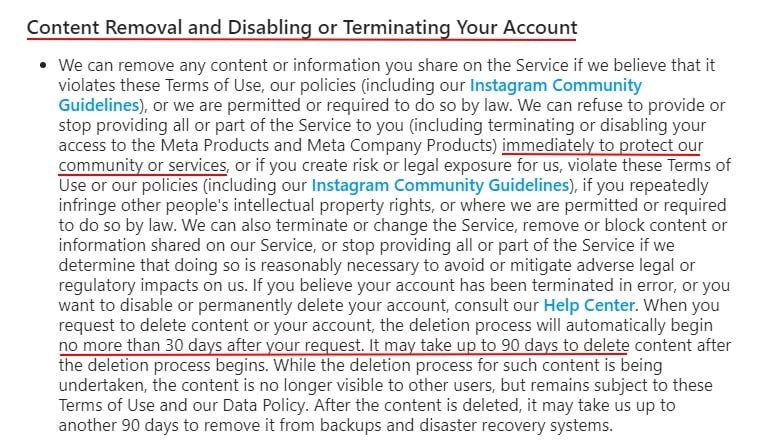
You can specify in your clause whether you're obliged to provide notice before deleting or suspending someone's account.
TikTok reserves the right to delete someone's account without warning, at any time and for any reason:

Even if you agree to give users notice before you block access to services, it's a good idea to specify situations when you can delete an account immediately e.g. breach of the User Agreement.
4. Consequences of Termination
Be clear about what happens if you delete someone's account or suspend access to services.
Here's an example from Section 7 of Etsy's Terms of Use. If Etsy terminates someone's account, the user loses access to their account and content posted there:
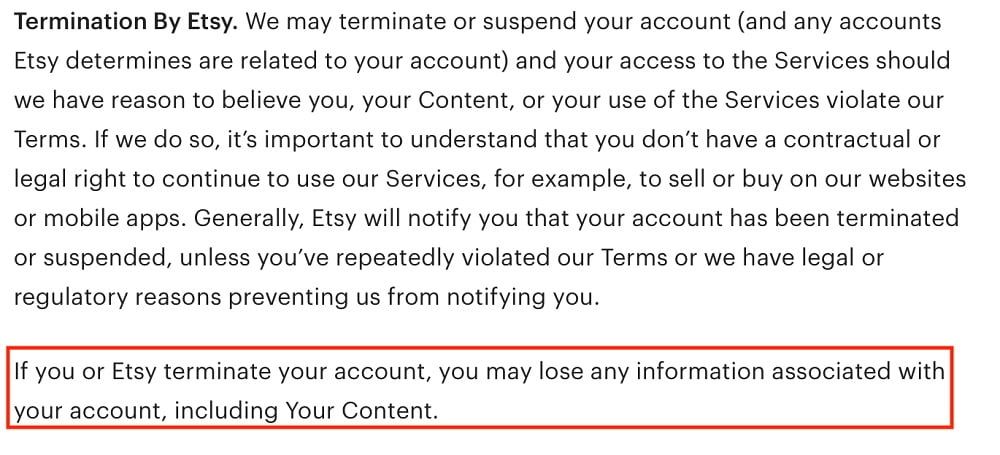
And SEMRush will stop providing services immediately, although it may take at least 30 days before it deletes a user's data:

You can decide the consequences of termination. Just make sure they're clear.
5. User Generated Content
User generated content (UGC) includes messages, images, text, and videos. If you allow users to create UGC, you must decide what happens to it when any service agreement ends.
Depending on which laws apply, you might be required to give the user time to download or move their content. In other cases, you may be free to simply delete the content or prevent the user from accessing it again. Always check with an attorney if you're unsure which laws apply.
As an example, DeviantArt reserves the right to delete UGC after terminating a user's account:

TikTok's users lose access to their content if they delete their account. If TikTok terminates the service, access to UGC isn't guaranteed:
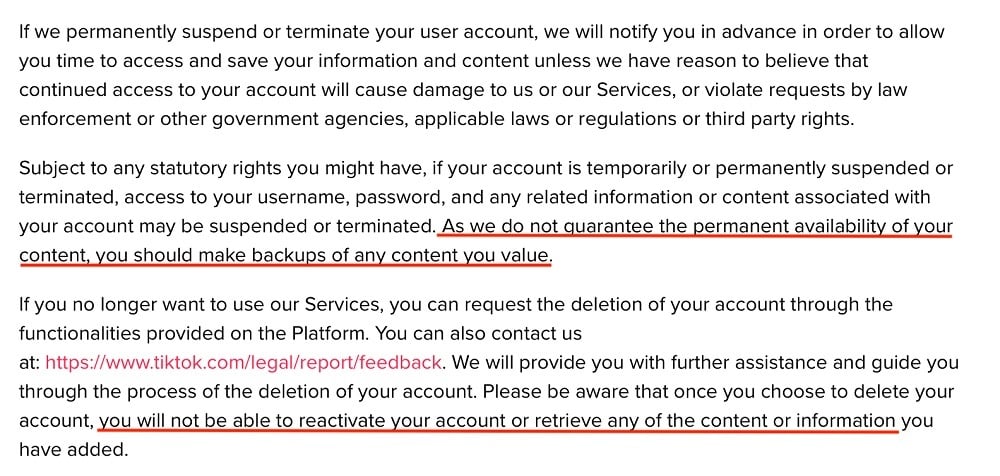
6. Refunds and Fees
If users pay to use your website or services, then you should consider two points:
- Whether you'll offer refunds if you cancel someone's account
- If you can claim any outstanding fees after terminating an account
SEMRush's refund terms are very clear. If someone pays for services they haven't used, and they cancel their account, SEMRush gives them a refund. If someone breaches the Terms of Service, SEMRush won't give a refund and the user must pay all unpaid fees due:

Be aware that state and national commercial law may determine your refund policy, so always consult the relevant laws before drafting your clause.
Conclusion
Every contract between your business and its customers needs a termination of service clause. This clause regulates what happens if you need to terminate someone's account or stop providing your services, or how a user can stop the relationship himself.
You will normally find termination of services clauses in website Terms and Conditions agreement.
The clause should cover the following scenarios:
- Grounds for account termination
- How users can terminate their account
- When service or account termination takes effect
- The consequences of termination
- What happens to user generated content upon termination
- How refunds are handled (if applicable)
Without a termination of services clause, it might still be possible to rely on common law rights to end a contract. However, there's a chance you could face penalties, and users might argue they're entitled to continued services. You should always have a termination clause to avoid confusion, delays, or legal issues.
You can use a Terms and Conditions generator to create your own clause, or you can write your own clause by reading example clauses. Or, you can ask a commercial attorney for help with your contract.


